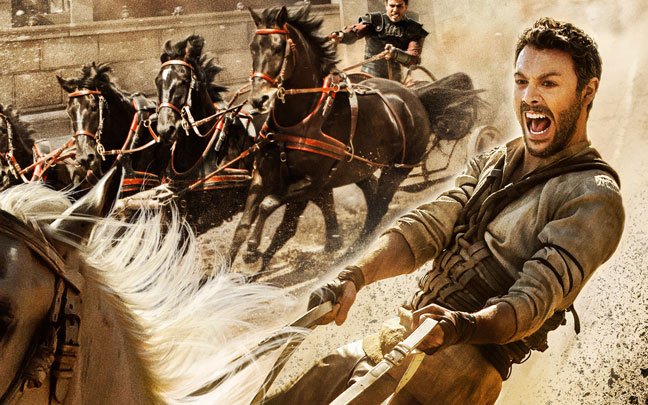Despite the fact that Jerusalem is under the sway of the Roman Empire, Ben-Hur has remained on harmonious terms with the military and political powers-that-be and is even the adoptive brother of Messala (Toby Kebbell, Dawn of the Planet of the Apes, Fantastic Four), a childhood friend who is now a high-ranking Roman officer.
But while watching a Roman procession wind its way through the narrow streets of the city, Ben-Hur accidently jars loose a roof tile onto a high-ranking official's head.
Roman justice is swift and merciless. Accused of inciting rebellion through an act of violence, Ben-Hur is arrested and condemned to the galleys—a fate worse than death. To add insult to injury, Messala callously refuses to defend him. Ben-Hur's mother and sister are thrown into prison, his palatial mansion is shuttered up and abandoned, and everything he once held dear is no more.
As a chained and manacled Ben-Hur is marched away to the galleys, the only thing he has left is a burning desire to avenge the wrongs done to him by Messala.
Little does he know that the most fateful moment of his life is yet to come, for while he is marched away to the seacoast, Ben-Hur meets a man named Jesus (Rodrigo Santoro, The 33).
A New Take
Written by Lew Wallace in 1880, Ben-Hur: A Tale of the Christ became one of the bestselling novels of all time. By 1912, more than a million copies had been sold in North America, and it was in great demand throughout the world. A stage version and two screen adaptions—a silent film made in 1925 and the 1959 Charlton Heston epic that went on to win a record-breaking 11 Academy Awards—made Ben-Hur a household name.
Why does Hollywood feel the need for a Ben-Hur refresh?
“It's different in the sense that Keith Clarke and I went back to the Lew Wallace novel and excavated the relationship between the two main characters, Ben-Hur and Messala,” co-screenwriter John Ridley responded in a recent interview. “There are things about the 1959 movie that we remember, including obviously the chariot race, but there are elements of that movie—the heart of the film, the emotional drive of the film—that we want to try to bring to a whole new audience. It's certainly one that people are going to come into with expectations, but like anything you do, you gotta exceed those expectations. We believe we've got something unique.”
The Way Forward
A person's life can change in an instant. Ben-Hur's did when the roof tile was dislodged. He harboured a burning desire for revenge on Messala, which sustained him through his years as a galley slave.
During a sea battle with pirates, Ben-Hur saves the life of a Roman admiral who, in turn, grants him his freedom and gives him a new life as a nobleman who wins acclaim as a charioteer at Rome's Colosseum. Returning to Jerusalem, a chance meeting with Sheik Ilderim (Morgan Freeman) gives Ben-Hur the opportunity to confront Messala during a climactic chariot race, but a series of encounters with Jesus changes his way of thinking. Jesus taught that violence is never the answer and His example helps Ben-Hur discover grace, mercy and, ultimately, redemption.
“Ben-Hur is a beautiful re-imagining of an epic story,” says executive producer Roma Downey. “Viewers won't be disappointed with that. It's epic. But it's also a story of redemption, reconciliation and forgiveness.”










Leave a Comment